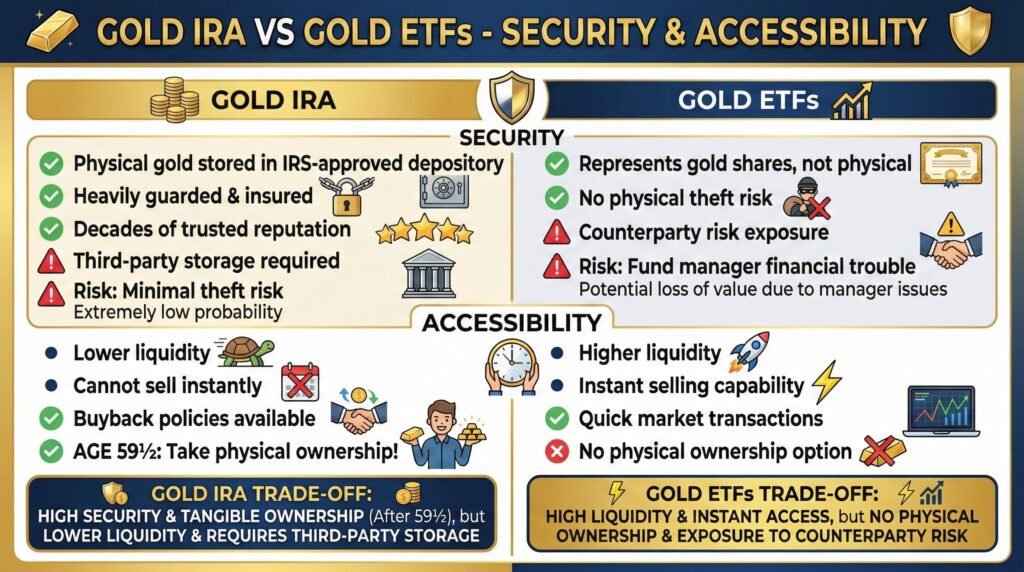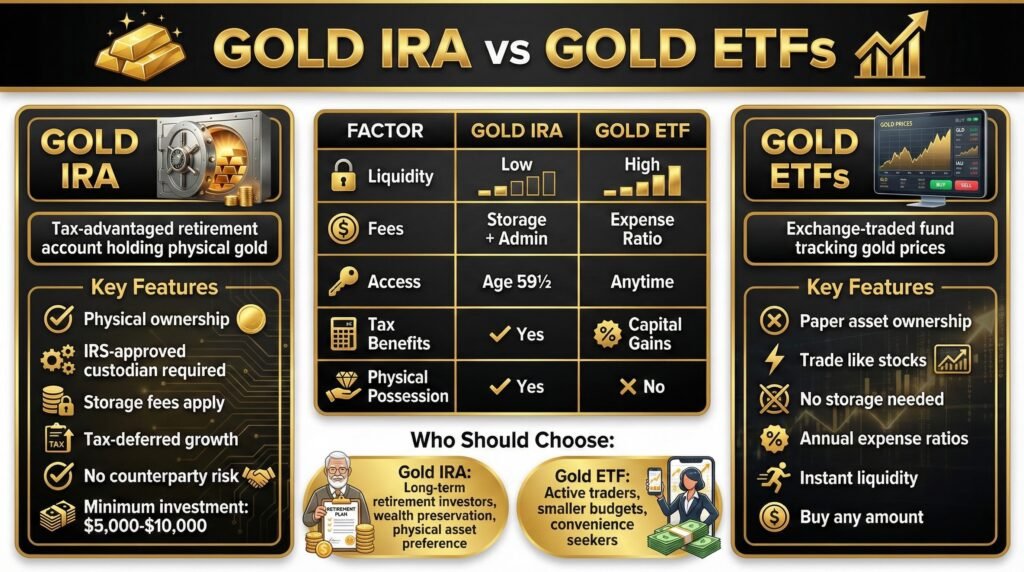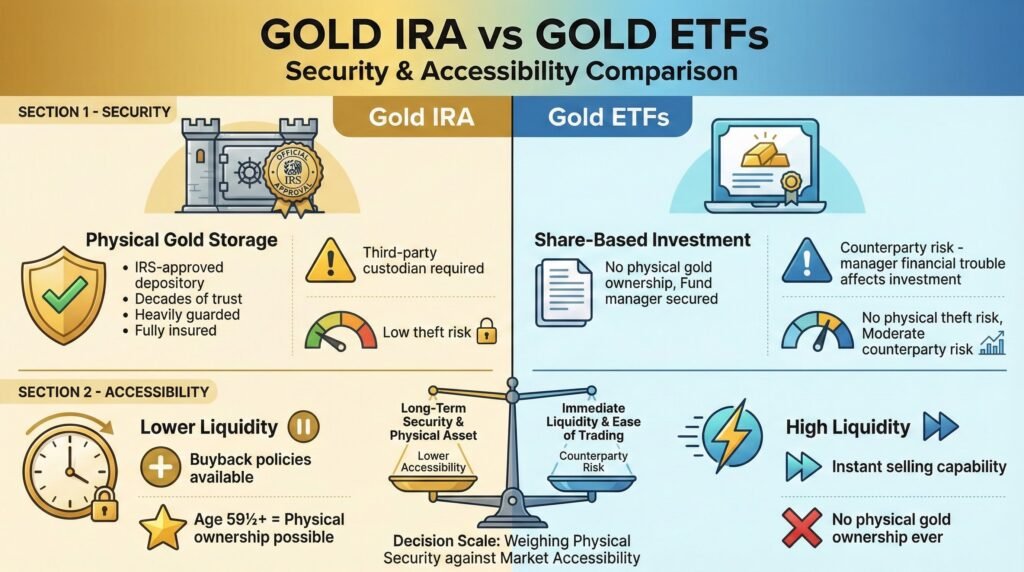Gold IRA vs Gold ETFs

Gold IRAs and Gold ETFs serve different investment purposes. A Gold IRA, a self-directed retirement account dealing with physical gold, offers stable, long-term, tax-deferred investment growth, albeit with management and storage fees. Early withdrawals may incur penalties.
On the flip side, Gold ETFs, which track gold price movements without physical ownership, offer high liquidity and eliminate storage costs, but they involve greater counterparty risk and are subject to capital gains tax, which can reach 28% for long-term holdings. Also, expense ratios ranging from 0.25% to 1% can affect your returns.
Your choice should align with your investment goals and understanding of financial implications – insight that we’ll acquire next.
Understanding Gold IRA and Gold ETF

Delving into gold investments, we must first understand the two primary avenues: Gold IRA and Gold ETF.
A Gold IRA, or Individual Retirement Account, is a self-directed retirement account that enables you to invest in genuine gold and other precious metals.
It’s a remarkable option for diversifying your retirement portfolio beyond traditional equities and mutual funds. Importantly, the physical gold in a Gold IRA is stored in a secure and IRS-approved depository, giving you peace of mind about its safety.
On the other hand, a Gold ETF, or Exchange Traded Fund, offers another way to invest in gold. Unlike a Gold IRA, a Gold ETF doesn’t involve owning physical gold. Instead, it’s a tradable investment that tracks the price movements of gold. This means you get exposure to gold without the storage and insurance costs associated with owning physical gold.
Critically, each investment avenue has its unique advantages. A Gold IRA allows for tax-deferred growth and provides an effective hedge against inflation, given that gold prices typically rise when the cost of living increases.
Conversely, Gold ETFs are more cost-effective due to their lack of storage and insurance costs. They also offer high liquidity, meaning you can easily buy or sell your shares at any time.
However, both investment options also come with risks. For instance, Gold IRA investments entail third-party storage risks, while Gold ETFs are sensitive to market volatility. As a result, it’s important to carefully consider your financial goals, risk tolerance, and investment horizon before choosing your gold investment route.

Tax and Cost Implications
Maneuvering the domain of taxes and costs associated with Gold IRA and Gold ETF investments, it’s clear that each avenue comes with its unique financial implications. Let’s start with Gold IRAs.
One of the chief benefits of a gold IRA is tax-deferred growth, meaning you won’t pay taxes on your investment until you make a withdrawal during retirement. However, not following the gold IRA withdrawal rules can lead to possible penalties and taxes if you withdraw before age 59.5.
Additionally, the IRS requires that a qualified trustee or IRA custodian manage the Gold IRA, and these services come with fees. However, certain gold IRA companies will offer a waiver or reduction in fees dependent on the contract. Knowing the specific rules and regulations specific to precious metals IRAs is crucial.
On the other hand, Gold ETFs are considered securities, and consequently, they’re subject to capital gains tax.
The rate hinges on your income and how long you’ve held the investment, but it can reach up to 28% for long-term investments. Additionally, Gold ETFs come with expense ratios, which are annual fees charged as a percentage of your investment, typically ranging from 0.25% to 1%.
It’s also worth noting that the cost of owning physical gold in a Gold IRA includes storage and insurance fees, while Gold ETFs, being paper assets, eliminate these costs.
However, the convenience of ETFs comes at a price known as the bid-ask spread, the difference between the highest price a buyer is willing to pay for an asset and the lowest price a seller is willing to accept.
Understanding these tax and cost implications can greatly influence your decision between investing in a Gold IRA or Gold ETF. Making an informed choice can optimize your investment growth and minimize unnecessary costs.
To learn more about the advantages of tax-deferred gold IRAs right now, click the banner below to access and download Augusta Precious Metals’ gold IRA checklist to make sure you are aware of all aspects of the gold IRA process:
Comparing Investment Strategies
When it comes to comparing investment strategies for Gold IRAs and Gold ETFs, or physical gold vs paper gold, there are several key factors to contemplate. Let’s explore the details.
Firstly, Gold IRAs are primarily a long-term investment. They’re ideal if you’re looking to diversify your retirement portfolio and hedge against economic uncertainty. The reason is, that gold tends to retain its value over time, providing a safety net against market volatility that can erode the value of paper assets.
Plus, with a Gold IRA, you have the option to take possession of the physical gold upon retirement.
On the contrary, Gold ETFs are more fluid and are better suited for short-term trading. They track the price of gold, allowing you to buy and sell shares as you would with a regular stock, offering a high level of liquidity.
However, keep in mind that the value of a Gold ETF is tied to the market price of gold, which can be volatile.
Next, let’s consider flexibility. While Gold IRAs allow for investment in various types of precious metals, Gold ETFs often focus solely on gold. This means a Gold IRA offers more diversification within the precious metals sector.
Evaluating Security and Accessibility

Building on our discussion of investment strategies, let’s shift our attention to the domains of security and accessibility. These are key considerations when deciding between a Gold Individual Retirement Account (IRA) and Gold Exchange-Traded Funds (ETFs).
In terms of security, a Gold IRA has an edge as your gold is stored in a secure, IRS-approved depository. The downside? You’re entrusting your assets to a third party, which can be unsettling for some.
However, keep in mind that these approved depositories’ reputations are built on decades of trust, are well-vetted, and are heavily guarded and insured, reducing the risk of theft.
On the other hand, Gold ETFs don’t involve physical gold. Instead, they represent a share of gold, which is stored and secured by the fund manager. This eliminates the risk of physical theft, but exposes you to counterparty risk. Should the manager run into financial trouble, your investment could be at risk.
Accessibility is another critical factor. Gold IRAs are less liquid than Gold ETFs. You can’t sell your gold instantly; however, the majority of gold IRA companies, like the ones listed at the end of this artcile offer convenient and competitive buyback policies.
However, remember that with a Gold IRA, upon reaching the retirement age of 59½, you can take physical ownership of your gold. This isn’t possible with Gold ETFs.
Best Gold IRA Company for Low Investment Minimums
Key Considerations for Investing
A multitude of factors come into play when deciding between a Gold IRA and Gold ETFs, making it essential not to overlook any key considerations.
Your investment decision should be guided by a thorough understanding of both investment options, your financial circumstances, and your long-term investment goals.
First and foremost, consider the tax implications. With a Gold IRA, your contributions can grow tax-free, and the tax isn’t due until withdrawal. On the other hand, Gold ETFs are classified as collectibles for tax purposes, with capital gains taxed at a maximum rate of 28%.
Next, take into account the costs involved. While Gold IRAs require storage and insurance fees, Gold ETFs have an expense ratio that can eat into your returns over time.
Another significant consideration is your investment horizon. If you’re eyeing a long-term investment and retirement savings, a Gold IRA might be your best bet. But if you prefer a more liquid, short-term investment, consider a Gold ETF.
Lastly, don’t discount the importance of diversification. While both Gold IRAs and Gold ETFs can add diversity to your portfolio, the former allows for a broader range of precious metals, tangible ownership, and eliminates counterparty risk inherent with paper gold products.
Finding the right gold IRA company for your individual needs is critical. For example, if you require a low investment minimum to start a gold IRA, Birch Gold Group or American Hartford Gold would be two choices to consider. However, if you are a serious high-net-worth investor who can afford a higher minimum to take advantage of the most competitive gold prices, then Augusta Precious Metals would be a good fit. Furthermore, Noble Gold Investments provides gold IRA as well as private investment options for home storage. Decide based on your individual needs.
Click the banner below to access and download Augusta Precious Metals’ gold IRA checklist to make sure you are aware of all aspects of the gold IRA process:
Gold IRA Calculator

Having a means of tracking the appreciation of your gold IRA investments is crucial.
Calculate the potential growth of your Gold IRA investment compared to traditional stock market returns. Adjust assumptions to see how different factors affect your retirement savings.
Access the gold price calculator by clicking the button below and bookmark it for future use:
Conclusion
In summary, both Gold IRAs and Gold ETFs come with their own unique benefits and drawbacks. Your choice should hinge on your specific financial goals, tax situation, and risk tolerance.
Always remember, diversification is key in investing. So, whether you opt for a Gold IRA for its tax advantages or a Gold ETF for its liquidity, make sure it complements your broader investment strategy.
Study the data, consider your options carefully, and, if necessary, seek professional advice.
If you have 100k in savings to protect and want to take advantage of the best gold prices and lifetime customer support, attend a free gold and silver educational web conference hosted by Augusta Precious Metals. Secure your place today by clicking the banner below.
If you have 100k in savings to protect, attend a gold investment educational webinar hosted by Augusta Precious Metals. Tap the button below:
Obtain a gold IRA guide and talk to a broker





Gold IRA FAQs

Adam ONeill
Author, lifelong investor, and creator of PreciousMetalsInvestmentPortfolio.com



